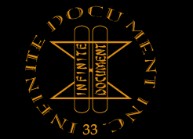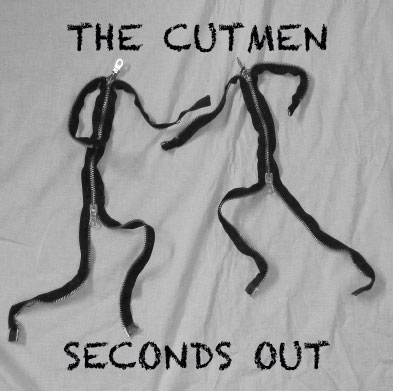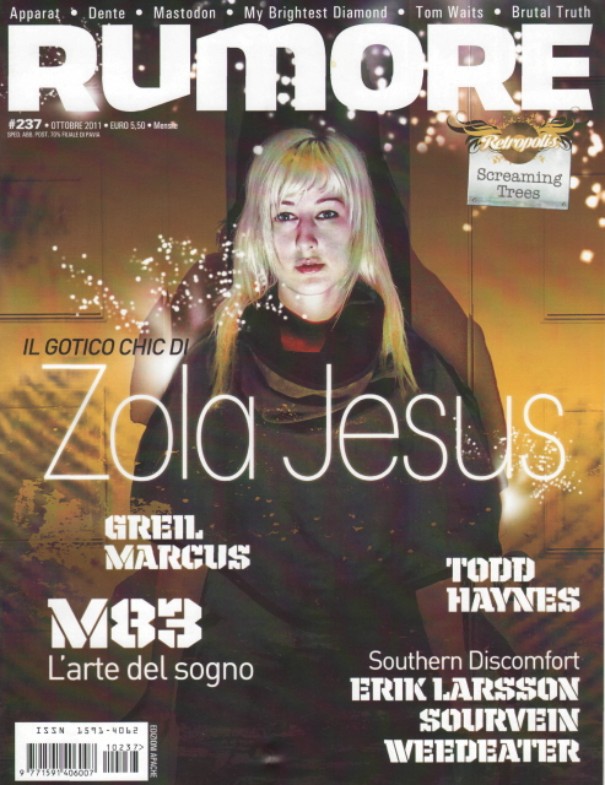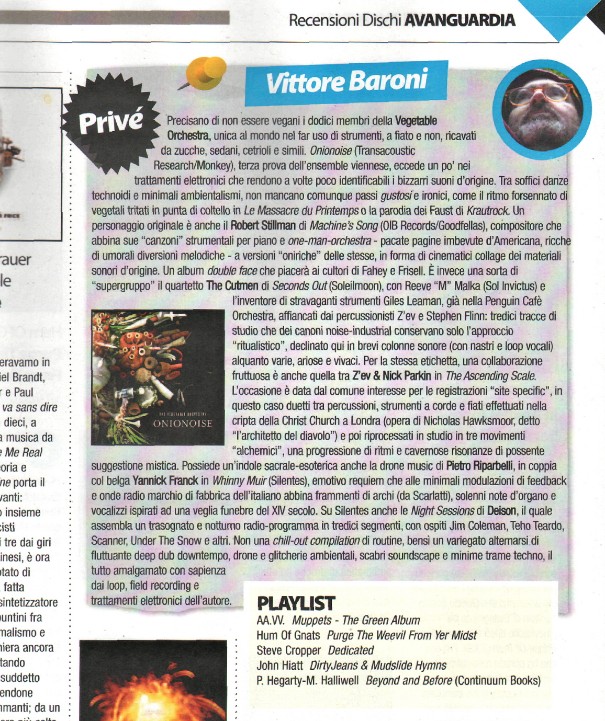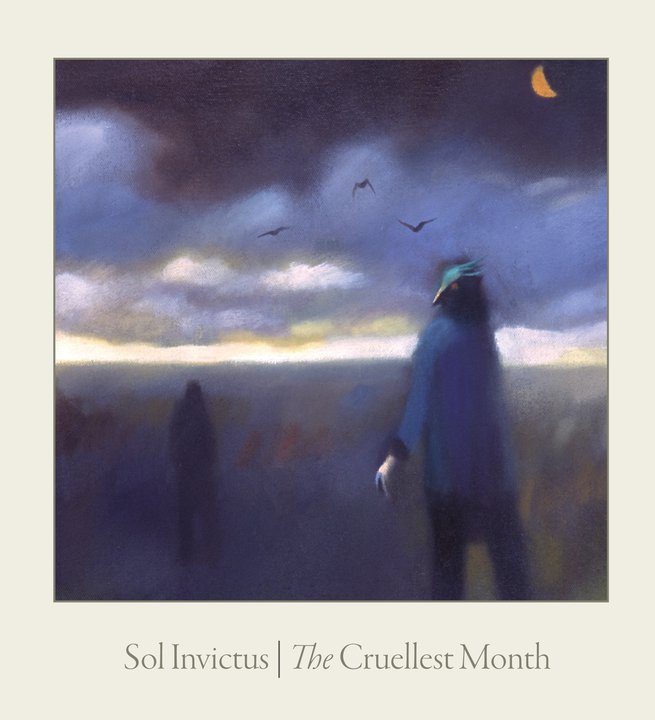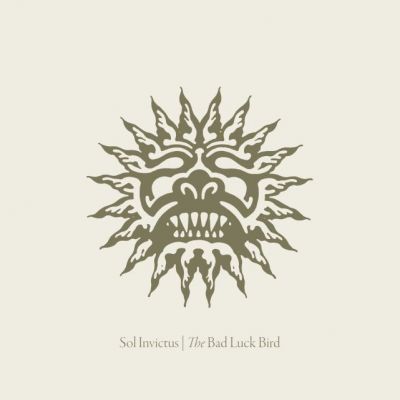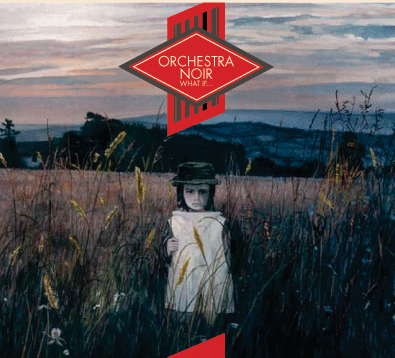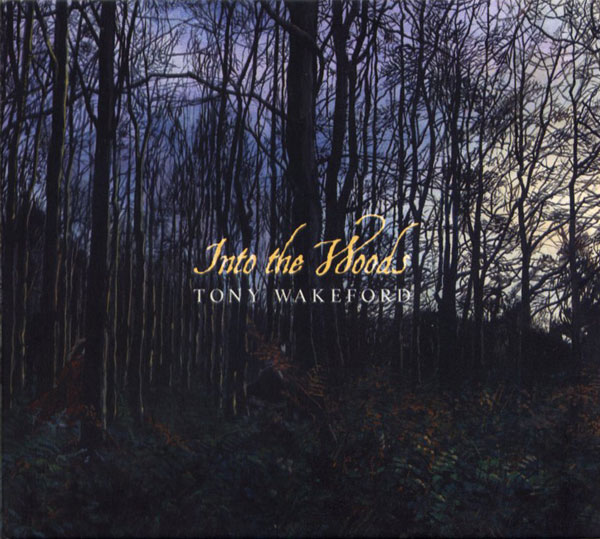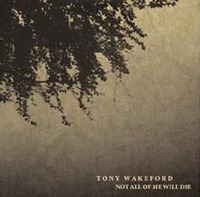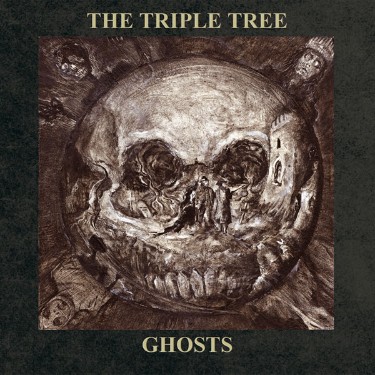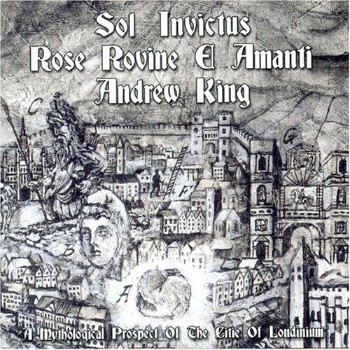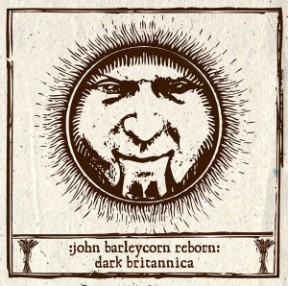Author: RaF kultur
(terrorismus)
Sol Invictus surprised me in 2005 with a strong album, "The Devil's
Steed". The last time I have seen this ensemble live was at the 15th
anniversary of The Black Cave in 2009. Too short due to technical problems, but
enough to see again their intense and dark neofolk, and to wish for a new
album.
With "The Cruelest Month", the ensemble is back; blacker,
cynical, vicious and more melancholic than ever. The album opens beautifully
with "Raining in April”, where the typical violin quickly is replenished
by the acrimonious, accusatory voice of Tony Wakeford. The oh so familiar heavy
drums, percussion and the acoustic guitar complete the instruments and suddenly
there's that typical Sol Invictus sound that penetrates to the bone.
Andrew King, our dear bard, may follow rapidly with its lovely soft
voice. He brings us "The Sailor's Aria" , a brief trifle, but so
beautiful. The intro is a beautiful adaptation of a song by Henry Purcell.
The aria and accompanying seagulls can seamlessly turn into "Fool's
Ship" which accentuates another typical Sol Invictus sound, the flute,
which makes me melancholy muse, forces me back into melancholy. The assertive
and accusing voice of Tony pushes me further into my corner, psychologically
tormented and in a virtual protective fetal position, but painfully intense
enjoying this song.
"Edward" brings us the beautiful collusion of Tony &
Andrew, set against an incredibly beautiful melody, driven by atonality. The
two gentlemen narrate/sing intense. "What did you kill your dear little
brother for?
O my boy come now tell it unto me...... O and that will never, never be "
During "April Rain", an instrumental, intensity and
originality keeps surprising us, an ethnically tinged song building a
compelling character based on a varying synthesizer melody where violin, flute,
percussion, cello and a dreamy guitar may weave a complex sound carpet through.
The album is a succession of intriguing tunes, including Andrews
fantastic interpretation of the mass murder ballad "Cruel Lincoln"
which grows up to an intense aggressiveness I actually only know of their live
performances.
Finally, über-cynist Tony may present to us the last track: his
interpretation of war song "The Blackleg Miner". It is the thirteenth
track of the CD and thus he delivers us the thirteenth gem.
Needless to say again how brilliant "The Cruelest Month" is,
but other artists will have to work damn hard to get it out of my top
10 for 2011.
Ward DE PRINS 23/05/2011 PEEK-A-BOO MAGAZINE
It’s been a year or six since the last proper Sol Invictus album, and
we’ve had to turn to Tony Wakeford‘s consistent work on various side
projects (The Triple Tree, Orchestra Noir, Grey Force Wakeford) and solo works
to follow the man’s current musical directions. Nevertheless, it seems he’s
gathered enough inspiration from all these endeavors to infuse Sol Invictus’
seminal neofolk with some new influences.
As has been the case with practically all albums by the band in the
almost 25 years of its existence (an impressive datum in itself) there is some
recycling of themes, melodic motifs, and composition structure. What fascinates
me is that despite of this, and with the help of a varying and ever-changing
musical arrangement, most of these albums are still interesting and fresh
enough, and The Cruelest Month is no exception. Tracks like
“Something’s Coming” and “Toys” (though the latter is lyrically very enjoyable)
have perhaps a bit too much of that “heard this before” feeling, but overall,
there is a lot of variation. Andrew King‘s rendition of traditional (“Edward”
and “Cruel Lincoln”) differ from his solo works in the addition of the Sol
Invictus band, and practically embody the part of neofolk that is rooted in
folk balladry. Tracks like “Stella Maris” and “Fool’s Ship” tackle a more
expansive sound and nautical theme where the rich arrangements for flute (Guy
Harries), dulcimer (Reeve Malka) and violin (Renee Rosen) truly shine. The same
point applies to the brilliant instrumental “April Rain”.
Another selling point of The Cruelest Month is the collection
of series of tracks that have been all over the place, except together on a
definitive Sol Invictus studio album: “To Kill All Kings”, “The Bad Luck Bird”,
“The Cruelest Month”, and “The Blackleg Miner”. All are live staples, typical
anthems, or at least bound to become one, so it’s good to have them all here. I
must say that a bit more fire could have gone into the delivery of these here
and there, but overall, these are solid tracks, and more examples of what has
kept Wakeford’s compositions interesting throughout the years: a strong sense
of rhythm, song structure, and memorable melodies.
The first couple of drafts of this review in my head compared The
Cruellest Month to side project albums that have impressed me the past few
year (Ghosts by
The Triple Tree, Marble Heart by Grey Force Wakeford, Not All of
Me Will Die by Wakeford solo). The greater degree of experimentation that
Wakeford displayed on such albums is in some sense laudable, and part of me
wishes a bit more had trickled through into this one. All the same, this is a
Sol Invictus album, and another part of me realizes that staying relatively
faithful to the song-based tradition of neofolk is what keeps the band on track
as a project. In that light, the balance struck between tradition and more
loose composition and instrumental play on The Cruelest Month is
excellent. So, it’s a new album by what stands as the mainstay band of the
neofolk genre, and though it’s not a thoroughly surprising one, I’d say it’s
exemplary and at the top of what the genre has to offer.
Reviewed by O.S. Evening of
Light
Sol Invictus has been a recognizable name in the neofolk scene for such
a long time now, that it is hard to imagine what else Tony Wakeford and his
ever evolving ensemble of collaborators could bring to a new release. Yet ‘The
Cruelest Month’, their first album in five years, continues to progress the
band’s sound be acknowledging the endearing sound of their earliest materials.
Wakeford’s voice is still instantly recognizable amidst the complex
orchestration of instruments, cutting through with utter conviction. While the
melding of classical, folk and progressive sounds shows the group’s song
writing at its best. All styles and instruments blend into rich and varied soundscapes
enhancing the mood of the powerful lyrics. Wakeford could have always been as
stripped-back as he wanted with Sol Invictus and the music would still resonate
with energy and feeling. But by surrounding himself with talented musicians he
continues to push boundaries.
Songs like ‘The Sailor’s Aria’/‘Fool’s Ship, ‘Toys’, ‘April Rain’,
‘Cruel Lincoln’ and ‘The Cruelest Month’ provide the album’s highlights whether
they’re re-imagining sea shanties, perverting childhood memories or adding an
apocalyptic slant to a traditional song.
The album’s production is perfect in the sense that it isn’t perfect.
The mix is effective in giving the different instruments the power they need to
add to the atmosphere of the songs. But it’s that slightly rough edge to the
overall sound of the album that gives it an endearing quality that the earlier
Sol Invictus album’s possessed, without sounding outdated or unprofessional.
Sean M. Palfrey MTUK
Six years after "The Devil's Steed" occurs with "The
Cruelest Month," a new album Sol Invictus. That the new album would
follow on seamlessly from its predecessor - it should have counted only a few,
too drastic and painful of human bloodletting that followed the years of
"The Devil's Steed". By ERIC ROGER CHARLES BLAKE and, next to
the only remaining member from Tony Wakeford of Sol Invictus-primordial soup of
the late eighties, two heavyweights left the band to devote himself entirely to
the megalomaniac project Game Bolg. From "Steed" album can be
found next to his wife only WAKEFORD RENE ROSEN on the successor.
WAKEFORD ANDREW KING and won a number of mostly young and unknown musicians on
board. This press on the new Sol Invictus sounds their personal
stamp. The new album is complex and is composed of equal numbers of typical
SOL INVICTUS Parts, still-experimental sounds and traditional songs. The
change of scenery will be addressed in the vocal performances by KING,
depending on the audience-most or the most penetrating Gusto WAKEFORD sidekick
since IAN READ, of course, very clear. "Edward", "Cruel
Lincoln" or "The Sailor's Aria" might be so even on a pure
finding Andrew KING plate. Even with these three (semi-) traditional music
is a fraction of Sol Invictus's past shows that can be transferred to other
compositions: Mixed at Sol Invictus earlier hymnal into the saturated by
WAKEFORD biting cynicism Elegies always a healthy dose of pride and epic,
a kind of "now more than ever" Despite, these seem to "The
Cruelest Month" largely disappeared.
Songs like "Fool's Ship" or "Stella Maris" splash pleasing
even to himself, was about "complacency" no word that could have been
brought earlier in connection with the creation WAKEFORD. This becomes
obvious in the bass work by CAROLINE JAGO: Live she was never guilty of the
evidence that they mimic the style of her predecessor BLAKE Knarzig not only
can but to enrich their own interpretations. "The Cruelest
Month" has no place for compositionally largely emphases of this kind,
often it is simply a lack of corners and edges, which could emphasize
rhythm. This is a cold and acting strangely dissociated
production. The many progressive games, including the cabaret-like
"toys" that act as foreign bodies and remnants of the solo work of
the artist.
Is "The Cruelest Month" which is why a bad album? No, but you
can see the disk at the hearing that there was potential wasted. Songs
like "Kill All Kings," "Something's Coming" or "The
Blackleg Miner" would, if we disregard the technological weaknesses, Sol
Invictus-nineties on each production can be accommodated. Has at worst in
this respect, the single "The Bad Luck Bird 'caught: On the seven-inch
disc, the piece shone in the best, minimalist Sol Invictus tradition - maybe
it's the best Sol Invictus-piece since the beginning of this millennium -
and Hunger on the comeback album of one of the greatest neo-folk combos
made this planet. The version on "The Cruelest Month," however,
was kaputtorchestriert with tens of instruments and loses the rugged charm of
the original. Hard to imagine what beauty might hide under the surface of
the other songs when one compares the two versions of the song ...
Six years ago, Stephan Pockrandt asked in his review at this point, if
"The Devil's Steed" had become the most homogeneous album by Sol
Invictus. This question is not answered here, but "The Cruellest
Month" could be the most heterogeneous album since "Against the
Modern World" and "Lex Talionis" is. This respect. Maybe
people "Cruellest The Month" at best as a blueprint as a starting
point and starting point for the future and a second spring, the band, enough
approaches do exist. Where to move other founding fathers of Apocalyptic
Folk genre for years in an artistic dead end, WAKEFORD stands at a crossroads
with many exciting options. "The Cruelest Month" documents but
rather a group that remains at precisely this point, instead of marching boldly
into one of the many possible directions. From this can be seen on the,
no: his only successor to the curious. The invincible sun must not die;
especially Sol Invictus now finally has a serious label in the
back. Therefore WAKEFORD and his new team back on the next album but must
simply reload a few coals.
Richard K. for nonpop.de
What do the three legends when they come in the years?When it comes to
the "big" years of neofolk, then inevitably fall, the band name Death
in June, Sol Invictus and Current93.And even if the name is Dij this review is
to be no basis for political discussion. Sol Invictus are no longer part
of this discussion. But what is now the three big bands? Mr. Pearce
is sitting in his specially created isolation (enannt Fort
Nada) and released the same old
musical and thematic ideas, which sold well only because of the name Death in
June, and because the Lord has such a beautiful voice that even CDs with songs
and Lift-selling piano. Mr. Tibet
on the other hand pawing always new musicians and creativity to challenge
themselves and with each album Current93 friends and enemies. Mr. Wakeford
and Sol Invictus, 2005, the chapter ended with "The devils steed"
quiet, silent and sound.....2011, I hear "The cruelest month," Mr.
Wakeford has not kept its word. And ... that's damn good. For as
strong as on album number 17 (or 15 depending on how you count) has been heard
in my ears never Sol Invictus. Because Tony Wakeford has finally managed
to combine the three target elements of Sol Invictus cosmos too challenging and
denoch conclusive: "The cruelest month" is apocalyptic-folk, there
are traditional music and it's neo-folk, with all its samples and sound collages. And
"The cruelest month" is a big entity stumbles, but not headless
around between these very different worlds, but carries the listener into a
whole different world. Vocally, the album of Wakeford and Andrew King is
contested - both are in good shape (if I I may indulge the little jab toward Fort
Nada) and it is especially sad and
wistful Andrew King's voice that is simply made for traditional folk tunes
(especially "Edward" and "Cruel Lincoln"). The
acoustic guitar is still given plenty of space, the tunes are quiet, reserved
and build bridges to the past, the band build (as "Edward" and
"The Blackleg Miner" on the same basic melody, which is already
"Gods" / "No Gods "in the 2002s" throne "shaped). But
unlike the Current'sche minimalism of the last albums, or even halt the attacks
Mr. DiJ'sche Wakreford deep into the musical treasure trove classical
instruments like piano, violins, wind instruments, flutes, drums and sweeping
operations are there on the one side, sometimes lovely set, dissonant mauled as
in "To kill all kings." Harsh distorted electric guitars, drum
machines and synth parts are carpets on the other, "modern" side,
engage in folk, sometimes disturbing. We can be thankful for Tony Wakeford
"The cruelest month". It is certainly not a lounge-folk (second
jab, I beg your pardon), caresses the listener is not easy but is oblique,
sometimes daunting, sometimes terribly old fashioned and so much Sol Invictus
as never before.
Der Medienkonverter
A quick glance at the new release of Sol Invictus - "The Cruellest
Month" and immediately notice the first positive aspect. It's all
thanks to the cover. Appears on the image of Tor Lundvall entitled
"Murderer." Extremely mysterious, melancholic mood of seasoned and
somewhat defines the musical style, which is included on the disc. Well,
the cover artwork (though admittedly, that is excellent!), And the music the
music ...What this time Tony Wakeford uraczy us? Expect a rather hackneyed
schemes, or maybe a new and fresh look? Actually, it dominates the first,
but "The Cruellest Month" is an attempt of the highest
quality. Outset it is worth to recall that the band was founded in 1987
and its output has a significant number of publications. Latest album
consists of 13 compositions, among which in addition to their own songs are
well-known arrangements of folk melodies and folk songs such as "Cruel
Lincoln" or "The Blackleg Miner". The album is nostalgic,
it is full of sadness and pessimism, however, cleverly composed just relax,
soothing at the same time our minds. Minor mood builds a unique atmosphere
of this disc. Works wonderfully addictive Sol Invictus, making the sail
far away in a completely separate reality. According to the adopted
so-called top-down assumptions. folk music, to create this type of track
is used mainly acoustic instruments. When composing "The Cruellest
Month" was not too different. The album largely uświadczymy sound of
the violin, cello, acoustic guitar, accordion, flute and various types of
przeszkadzajek. In addition, we can also catch lots of drum kit and
electric guitar (occasionally wailing on the distinctive overdrive). Texts
written entirely in English, good blend of melodic lines. Tony Wakeford
not shuns them from cynicism interlaced pessimistic message. Layer
lyrical, through its specificity, without a doubt become an integral part of
this release. The sound achieved on "The Cruelest Month" is a
very clean and clear, so you will hear different nuances and
flavors. Summary of individual melodic lines of the instruments is well
centered, which makes the listening of this material does not feel discomfort
caused by too quiet sound of a particular instrument. The vocals stand out
nicely over the instrumental backing, without damaging the composition
scheme. As you can see, the album has many advantages. As for drawbacks,
the situation is completely opposite. I can only stick to the time
(somewhat) unfairly made the vocals, though I suppose that it is this author's
intention was, that was a little dissonance :-). Thirteen songs included
on "The Cruellest Month" invites us to do niekrótką and mystical
journey, after which the good memories last long in our memory. Neofolk in
this embodiment is a pleasure for listeners. Admittedly, the newest release
group led by Tony Wakeford is a really good album. It is very consistent
and interestingly arranged. There is no special voltage drop and creates a
musical layer like a permanent structure undisturbed. The last material
Sol Invictus is a must for fans of the genre, but also sincerely recommend it
to all those who are not indifferent to the sublime work of stylized folk
music.
Adam Hunchback Atmospheric
Neofolk, a musical genre that may be one. If yes, then you come to
the British legend Tony Wakeford of Sol Invictus around his main project in any
case. Functioned alongside other stars of the genre such as Death In June,
at which Wakeford as a founding member, is one of the musical child of the
portly Englishman, who helped start his career, even with the known post-punk
band CRISIS, namely, to spearhead the global Neofolk movement and now for
almost 25 years. With 'The Cruellest Month' which lays mostly with various
guest musicians working project for six years before a new album, which is the
first time on the German label Prophecy Productions / Auerbach published
record. Yet it is according to label one of the best ever works of
Wakeford and of course be absolutely perfect. Whether these allegations
are true, shall be determined in the following discussion. the whole thing
will be introduced by the monumental 'Raining In April', which reflect the
beautifully painted album covers seems perfect, lyrically and
musically. Such sound art we are used by Sol Invictus. So and not
otherwise be romantically tinged Neofolk sound, although Intended song is
advised in case of Britons already somewhat aggressive. On the disc there
are of course other pearls Wakeford's art of composition. The medieval 'To
Kill All Kings', which is subtly Irish ballad 'Edward' and the rock-anthemia 'The
Bad Luck Bird' songs are all first quality and are simply the best that one can
create in terms of neofolk. Towards the end you have to have the wonderful
'The Blackleg Miner' particularly point out because this song is a part of old
exploits recalls and represents the other hand, the excellent re-interpretation
of an old folk song. In addition to aforementioned sonic revelations
hidden in 'The Cruellest Month' a little lazy fruit when it comes to variety
and impressive of the listener. Some songs, let us take, for example,
'April Rain', will not ignite easily and splashing, even after the umpteenth
Hördurchlauf monotone nor to himself, without even begin to be anchored in the
memory. It would also in some tracks to warm up an old adage, less simply
been more, so the extremely sumptuous soundscapes interfere for example with
'Cruel Lincoln' even a little. Finally you have seen it say that the
positive sides of 'The Cruelest Month', the negative by a multiple tower above,
with one also must add that one of the new album Sol Invictus can not
necessarily call it a milestone. Fans of the first hour, but also all
other Neofolk freaks can access course soothes while as lowbrow metal band to
make a purchase consideration nor should risk a short trial run. Nevertheless,
there are now probably hard romantic, folkloric and as industrial Neofolk than
him Sol Invictus and practice their mastermind Tony Wakeford.
Sol Invictus has been around since the 1987, and is widely considered as
one of the forefathers of the neofolk scene. Even with that kind of
recognition, few people know about the group, which is the brainchild of Tony
Wakeford, who himself has been in the music scene since 1977. With a
record deal with Prophecy Productions in place, Sol Invictus figures to see a
small spike in the number of people who will listen to the band, and the first
full length since the signing The Cruelest Month is a good start.
For those unfamiliar with the Sol Invictus sound, they are a neofolk band with
industrial elements thrown in for good measure. Wakeford’s deep vocals
are as much of an atmosphere maker as the music itself, which is something that
most bands today cannot claim. The rather deliberate pace in which the
music is set is another key element to the Sol Invictus sound, as evidenced on
“Fools’ Ship” and “The Bad Luck Bird.” There is a lot to pick up
from The Cruelest Month, even with the minimalist method in which Sol
Invictus operates, as it can go from a German-influenced sound (“Toys”) to a
more traditional style of folk (“The Bad Luck Bird”). Many of the songs
are mechanical in nature, which is a byproduct of the group’s penchant for
mixing industrial elements into their sound. This isn’t necessarily a bad
thing, as it gives the listener a unique perspective on the neofolk
scene. Like most neofolk bands though, Sol Invictus is best enjoyed when
the atmosphere and the surrounding elements are at the ideal setting, so it
wouldn’t be recommended listening when you’re exercising, for instance.
Though there are no fillers on The Cruelest Month, tracks that are worth
checking out include “Cruel Lincoln,” “To Kill All Kings,” and
“Toys.”
Having been around for over two decades, Sol Invictus has been gaining new fans
with every subsequent album, and The Cruelest Month figures to be the
band’s most successful from that standpoint. Even if you had never heard
the band before this album, their influence can be heard, most notably in bands
such as Agalloch. The Cruelest Month serves as an intricate
atmospheric maze that will keep your attention for a while, and is worth
checking out if you have never heard of the group.
Reviewer: Peter Metal Psalter
One of the musical movements that have gone through over the past few
decades, a true metamorphosis is that of neofolk. Hardly a genre offers
bands, artists, and often controversial individualists compared a lot of
freedom to realize themselves, which probably explains the success of this
musical genre in the underground.
Among the most important, no questions asked bands that you should have heard
as a non-Neofolk at least include, in addition to Death In June Current 93 and
Sol Invictus especially. The latter is always understood, natural,
folkloric sounds expertly to be provided with synthetic subtleties, without becoming
inedible disharmonic.
In the extensive discography of Sol Invictus now joins the latest full-length
release "The Cruelest Month" field.
Fans of this band will be disappointed in any way. On the contrary,
by the improved musical skills and especially by the much more elaborate
production will be "The Month Cruelest" intense a listening
experience. It definitely are similarities to the classic "Sol
Veritas Lux" verzeichenbar in terms of song structure.
Most notable is probably the excellent vocals. This seems like a mixture
of "Irish-Folk" and "Sailor Song" to what the average,
without question, absolutely firm voice of the singer is
responsible. She's just intense and exciting, what this band helped always
been one of their special music.
As a musical foundation once again serves up an acoustic guitar, the hypnotic,
minimalistic riffs strikes again and again.
Was also on "The Cruelest Month" especially have been used even on
flutes, harp and violin-like instrument similar. This fund creates a truly
awesome sound strange, heroic and emotional atmosphere; the SOL INVITUS gives a
whole new sheen.
Again very model is also made use of synthesizers. You can tell that
this is an avant-garde music, since otherwise the artificial sounds very
natural sound image over again effectively distort and alienate. Sol
Invictus goes but here actually only as far as it is aesthetically acceptable,
why even non-supporters of neo-folk movement may well risk an ear. Equally
as sad as graceful and dignified are the 13 tracks, therefore, and inspire with
every second. Sol Invictus has become a musical maturity that seems
currently to be at the zenith. On "The Cruelest Month," a full
50 minutes are offered the finest Neofolk, who is at high level and quality
hard to beat. Any person interested in good, independent music-interested
people to take even a few minutes to a few tracks of this album to listen
to. Fans of this band should be "The Cruelest Month" has already
and if not, then it's about time!
Written by Jannick Neckbreaker Magazin
Nearly a quarter of a century is the creation of the British cult band
Neofolk SOL INVICTUS now been back almost a year and mastermind Tony Wakeford
was supported by various guest musicians, speak with new releases of
itself. Only in recent years it has been noticeably silent known to Sol
Invictus, and even gave himself Wakeford, finally, that the 2005 album
"The Devil's Steed" was perhaps the last. Sol Invictus 2008 made
their fans, however, new hopes: A Deal with Auerbach Tonträger / Prophecy
Productions was signed, then appeared in 2010 with the 7'''The Bad Luck Bird'
new material and now finally Wakeford finally released a new album: "The cruelest
month ". And even on first listen it becomes clear that Wakeford not
leave his chosen with Sol Invictus musical path after the release break wants,
"The Cruelest Month" seamless continuation of the previous work of
the band. The focus of the 13 mostly gloomy -enchanting, mysterious,
almost drab compositions is the unique and typical village singing Tony
Wakeford, Sol Invictus unmistakable style of the 'largely
accounts. Particularly impressive in my opinion, like the Englishman can
captivate the listener with his voice and can convey the message of the title,
especially without her varied use, only with their tone, their natural
expression. Even the instrumentation is about the length of almost a
complete album is not particularly variable missed, but not its effect. Soft,
fragile, beautiful and yet depressing, sad melodies, performed by strings,
flutes and acoustic guitar, rhythmically supported by Schalgzeug and percussion
swirl around the vocals Wakeford, invite you to dream, to flatter himself by
the ears and let the listener's everyday for a moment forgotten. Although
"The Cruelest Month" in my opinion is the best album Sol Invictus
NICH 'and even if one could criticize objective that the titles are very
similar, and some parts are drawn somewhat too much in length, The overall
picture of this album but very consistent and makes you look a the music, so
you can spend with this album many imaginative, dreamy hours.
katharina.becker metal.de
Very long time nothing was heard of the English Grand Master of the
Apocalyptic Folk, Sol Invictus, Tony Wakeford and its mastermind. One had
even fear that the great "The Devil's Steed" (2005), the last album
could be this legend, which over two decades ago that began to shape decisively
with Death In June and Current 93 an entire musical genre and to
coin. Even Tony Wakeford was assumed that would be "The Devil's
Steed" the last album the band's history. 2008, there were all fans
will have a legitimate hope, as the band signed with Auerbach records, which
are known to Prophecy Productions for their excellent band selection and
quality are known albums. So it should be then at least new editions of
previous studio albums by Sol Invictus. But that's not enough, there was
2010, a first real signs of life with "The Bad Luck Bird 'EP, and by that
date it was clear that all hopes were justified could be, and "The Devil's
Steed" in fact not the last album by Sol Invictus. So we are writing
the year 2011 and the ardent wait is finally over. All hopes were
fulfilled, as with "The Cruelest Month" is now the 17th Studio
album by the band before. Tony Wakeford has any burdens from the past and
rid created along with numerous guest musicians (including the exceptional
singer Andrew King), a new masterpiece, as far as I can tell in advance. SOL
INVICTUS present on "The Cruelest Month" strong as an ox. I dare
before even one step further and argue that the new album is certainly one of
the best in the band's history. And this is at such a grand predecessors
as "throne" (2002) and "The Devil's Steed" (2005) mean
something! the cover artwork alone with the painting "Murderer"
by Tor Lundvall makes her a lot. And also musically and artistically
presented to you at absolutely atmospheric technically high level and uses of
old strengths, without sounding stale. On the contrary. In addition
to the standard acoustic guitar have many other instruments used on "The Cruelest
Month" and one in particular the flute was given much leeway. With
"Edward", "Cruel Lincoln" and "The Blackleg
Miner" three traditional have received catchments, which all fall
seamlessly integrated into the overall work. In particular, Andrew King's
interpretation of the mass murder ballad "Cruel Lincoln" in this case
shows the quality that can offer Sol Invictus in 2011. King pushes the
song through its distinctive, sad and deeply penetrating the skin to voice its
very own stamp and provides lots of Goosebumps. Backed by drums and
acoustic guitar is "Cruel Lincoln" thus one of many highlights on
"The Cruelest Month". The class war anthem "The Blackleg
Miner" takes its place there and has to hide in any way. The song
describes intensity dealing with those mine workers who perform their work
despite a strike going on and thus show more solidarity towards the mine union
as compared to its own "fellow sufferers". The violent use of
such strike-breakers in the second half of song especially clear when the mood
beforehand umschwingt could be described as cheerful and relaxed, and is
threatening. "The Blackleg Miner" is wonderful is the mix of
neofolk and dark and Apocalyptic Folk, and can be used as a symbol for the
entire album. Lyrically, Tony Wakeford proves once again that he
understands it like no other, with the help of a lot of cynicism and pessimism
of the society to hold up a mirror. For example, in "Toys" series of
children's heroes such as Peter Pan or Action Man into criminals and shady
characters who indulge in a world not heal, but are also devoted to the
reprehensible things in the society. In a subtle way, here's fantasies are
taken apart in the good in the world and the infallibility of such children's
idols. The really calm, relaxed, "The Sailor's Aria", which is
accompanied by waves and seagulls screaming, a mysterious, treacherous
atmosphere gets breathed into and flows directly into says, "Fool's
Ship", whose title for himself. "Something's Coming" with
utter hopelessness waiting for did in music. The guitar holds back and
leaves it to the flute, to celebrate a haunting, sad melody while singing
Wakeford timid compared to the rest of the album works. A terrific
piece. But it can also Sol Invictus without poisonous and biting lyrics,
as the only purely instrumental on the album, "April Rain"
proves. Here spherical Neofolk is offered which is very thoughtful
overcast and produces a dense atmosphere. And if you're in dense
atmosphere, a fast-the song "To Kill All Kings" comes to mind, which
is equipped with a disturbing, turbulent soundscape, by the use of drum and
other musical side scenes reminiscent of a rebellion that will always jeopardizes
more and more threatening and chaotic. About every single song on this
album could write pages. Just as it has always been in songs by Sol
Invictus the case. Wakeford lyrics paired with the background music is
emotional, direct, and not sparing the listener. "The Cruelest
Month" is edgy, down to earth and because of the unique features vocals by
Tony Wakeford and Andrew King a high recognition value. INVICTUS SOL had
always enjoyed a high standard of quality in terms of their music. But the
bar has been with "The Cruellest Month" again a little further
up. Who can even begin with something only peripherally classic folk, this
record must have on the shelf. There simply is no way around this
squad. As a final note had mentioned that Prophecy Productions still has a
huge delicacy in the hindquarters. From the 10th June 2011, Collected Works of Sol Invictus
on the Prophecy Shop Online are available, which can be pre-ordered
now. The collection includes all 27 CDs and three DVDs of the band and is
therefore a must for any collector and fan
Conclusion:
There is only one word that describes this album perfectly a
Masterpiece
"The Cruelest Month" combines all the strengths of Sol Invictus, and
proves once again why the band is an absolute reference in the field of
classical Neofolk Apocalyptic Folk, Dark or.
The texts allow the listener through their cynicism and pessimism in a moment
her smile and inclined to think in another moment with worry
lines. Musically, you move between powerful and apocalyptic numbers, while
Tony Wakeford and Andrew King impress with their singing every song (especially
the Traditional) its own mark.
No matter how long I seek, I find in "The Cruelest Month" simply no
weak point. At least not as long as you even a little what can be done
with traditional folk music.
This album not only worth a buy recommendation, it should be a must buy!
Author: H. Malte metal.tm
Sol Invictus were long considered THE neo-folk band se, but because of
frequent member changes and weaker albums, it was 2005 at the latest after the
publication of "The Devil's steed" silent around the band of
mastermind Tony Wakeford. This had been scheduled as the album actually
completed the band, but his move to France,
as well as finding and retrieving new, as well as former members voted for him
and so will show "The cruelest month". Wakeford says about this
work: "It is a meditation on aging and decline, not only for the
individual, and also for the rich countries. It deals with the question
whether the cruelty of life is simply a reflection of the cruelty of God, or
whether we are merely cruel for cruelty's sake. It is a utopia free zone. "Thus,
one should not indulge in even the utopia; there would be merry melodies on
this album. Sol Invictus dominated early on the term "Apocalyptic
Folk" for their music and "Raining in April," underlines
this. On an already gloomy acoustic melody places a wrong-headed sawing
the electric guitar and above all looms the dark, sometimes very monotonous (speech)
voice Wakeford. This should also work for many listeners on the whole
album to get used to repulsive. In contrast to the monotony of singing is
the musical quality that should be beyond question. Songs such as
"Toys" or "Something's Coming" prove beyond doubt the
skills of the musicians. Compositionally, the work can be seen very
conflicting. While were traditional like "Cruel Lincoln" and
"The Blackleg Miner" outstanding implemented in the sound Sol
Invictus', but in many songs is clearly always the same rhythm, same structure
was used. Of course, neo-folk, no genre that sparkles with innovation a
bit more but it would have to be happy. Titles such as "Toys,"
"The cruellest month" and the instrumental "April Rain" as
proven that the band still has enormous potential. Taking "The devils
steed" as a yardstick, "The cruelest month" should be seen as a
quantum leap. But this would obscure the fact that alternate on the
current Silberling light and shadows, but overall it remains pretty
bleak. For die-hard fans the disc is a must in any case, whether earned
the band new fans remains to be seen.
Author: Bastian Schmatz cdstarts.de
Goodbyes are so easy for a seemingly never, sometimes they are probably
almost impossible if one has been in business for so long. Should
actually The Devil's Steed in 2005, the last album by Sol Invictus
have been. And now six years later, still follows a follower in the form
of The Month Cruelest .You could guess it already, since it was
announced live on a new album to work, and last year came in the form
of the Bad Luck Bird is already a foretaste out after six years and
now the new plant as the doyen of neofolk.
Thematically it is very dark once again to: Wakeford is a cynic by and
by, and presents a very pessimistic view: So you have in Toys see heroes
of childhood, how she never wanted to see - a criminal and immoral. Even
the apocalyptic Something's coming spread doom and gloom. This will
also be distributed at the beginning, when in April Raining in dark
rattling meet electric guitars and violins to paint a grim picture of the world
that pervades the album
The dreamy melodies lull one not only once: To kill all
things could be a dreamy folk song, but as the title is proved, then so
peaceful in the text but do not. Even the screaming after wanderlust The
Sailor's Aria is not what it seems when you look at it on the Ship of
Fools is located.
Besides singing Wakeford and Andrew King was given a lot of space, where
both achieve excellence. The tunes keep it pleasantly in the background
and leave because of the acoustic guitar almost pay songwriter atmosphere,
would not these constantly supplemented by a variety of instruments (flutes,
violins, piano, synthesizer or even once). All this makes for a coherent
picture.
The Cruelest Month is a fantastic album. Whether it is the
best in the entire history of Sol Invictus now, everyone must decide for
themselves. But the fact is that it is among the best in the history of
the project.
Tristan alternativmusik.de
Again, I was very specifically asked if I wanted to take on this
review. And again, I gladly said yes of course!
I did get the new work of Sol Invictus, which was also waiting for some
six years away! Nevertheless, despite Tony Wakeford has also recreated a
shekel, which makes the heart beat faster every neofolk fans!
In the usual Sol Invictus fashion the songs are relatively
quiet but forceful way. Imposing the CD begins with Raining in
April at about To Kill All Kings continue to run almost
medieval. The Sailor's Aria is one of my favorite songs. You can
almost taste the salt in the air. It's the same with fool's
Ship , which I like very much. Both songs remind me very much of my Scotland
trip. Edward is an Irish ballad, which is also just brought
over. Simply beautiful ...
In April Rain hear the rain falling in the wind and Cruel
Lincoln comes along very proud. The last two songs are then de
CD Cruelest The Month and The Blackleg Miner . Both
are simply great songs written by Tony Wakeford.
All who are somehow interested in Neofolk should listen to this album
often. I will definitely do it. Alone already succumbing to the
British charm, which admittedly not everyone's thing.
Beautiful dreams and have fun listening,
your Redhead
Redhead Night Shade
'The Cruellest Month' is very important for me because I assumed
that 'The Devil's Steed (2005) to be the last SOL-Invictus album would. I
got rid of me a few years ago but the rotten wood in the band, and 'The Cruelest
Month "shows that I've made the right decision. Still, I'm still
unsure if it's the end of something old or the beginning of something new.
"(Tony Wakeford) in October 2009 as SOL INVICTUS Germany played their
only concert, was already announced a new album and the set list contained ....
too many new pieces should Because after "The Devil's Steed" So it
will follow something but nothing came up now the 10th of June 2011, everyone should neofolk fan quite
thick noted in the diary, because it's done: on time the concert at this year's
Wave Gothic Treffen appears "The cruelest month", the 17th studio
album of the neo-folk legend. "The cruelest month" is a typical
Sol Invictus album. The 13 pieces are lovingly arranged and orchestrated. The
unmistakable vocals Tony Wakeford has been like and how we love him for years.
Even Andrew King is common to speak. The songs are edgy, painful, cynical,
pessimistic and aggressive sound. This must apocalyptic folk. No light fare for
beginners, but the Neofolk specialist will love the stuff. Wakeford describes
his new album as "a meditation on aging and decline, not only for the
individual, and also for the rich countries. It deals with the question
whether the cruelty of life is simply a reflection of the cruelty of God, or
whether we are merely cruel for cruelty's sake. It is a utopia free zone.
" In addition to songs from the poisonous pen of Tony Wakeford the
album contains a number of traditional songs, such as Andrew King's
interpretation of the mass murder ballad "Cruel Lincoln" or Wakeford
version of class war anthem "The Blackleg Miner". In addition to
these two Anspieltipps there are still hits such as "Toys",
"Edward", "The bad luck bird" and the fantastic title
track. Needless to say that "The cruelest month" is an absolute
buy recommendation and be part of any neo-folk collection Speaking collect.
Also on June 10, also appears the complete discography of Sol Invictus on 27
CDs and 3 DVDs in a slipcase box with Auerbach record!
imBlutfeuer terror GbR
Musik Magazin
Death lives longer. This old saying applies to time and again in
the music business. So went to the English folk musician Tony Wakeford
middle of the last decade strongly believe that is his dark-folk combo Sol
Invictus in their last breaths.
The 2005 released album "The Devil's Steed" he therefore
regarded as the last album the band. Now, six years later, Wakeford but
returns with new musicians and a fresh album back - the 17th Sol Invictus
studio album since 1987.
With its 13 songs is "The Cruelest Month" on a total playing
time of about one hour.
To hear is complex, relatively peaceful in the largely acoustic folk
guitar, violin and flute in the foreground. Over here is the typical,
quiet with mostly singing voice brought forward by Tony Wakeford. Most of
the pieces is kept in a gloomy, quite melancholic mood, but sometimes the sound
glides from too surreal.
"The Sailor's Aria" is an example of one of these cases - The
sound of the ocean sings a little sailor song Wakeford, which is backed by
one from somewhere ominous electronics background. In contrast, there are
also some very straight and tidy-looking pieces such as "Edward".
Lyrically offers "The Cruelest Month" partly dripping
sarcastic lyrics. Here is an example the song "Toys", is the act
of toy figures on long, long gone astray. In addition to such original
creations as well as the band uses traditional models such as the
"Blackleg Miner".
All this is implemented in the sedate, mystical folk garb. From
what you hear is the playing skills while fully in order, but of course you
should not expect too big leaps, because space for any nimble violin solos or
the like is not found in the quiet approach of the band for sure.
Anyway, directed "The Cruellest Month" less to Friends catchy
melodies and choruses tempered, but rather to those listeners who instead place
heavy emphasis on atmosphere and one intertwined for these longer deals with an
album.
Conclusion
Who can get comfortable with a cozy, dimly lit concept of Sol Invictus,
may look forward to a successful album.
Stefan Fruehauf
dark-festivals.de
|
|
|
The first album in six years from Tony Wakefield’s project sees the
controversial figure with a renewed energy. His take on the neofolk genre
has always been interesting, somewhere between typical JethroTull-esque
quirk and a more experimental apocalyptical direction that’s akin to
early Pink Floyd in psychedelic oddness. Wakefield himself dubs
his music "a cabaret band from Hell for the fin-de-siècle" which
sums it up pretty well; if The Cruellest Month proves anything to
me it’s that I should listen to much more neofolk than I do. This is a
rich, varied album, constructing soundscape after soundscape but never
failing to write actual songs. Wakefield, of course, is part of neofolk
royalty, having been a founding member of Death In June and
worked with many stars of the scene.
And despite that aforementioned six-year break, The Cruelest
Month shows there still to be plenty of lead in this project’s pencil.
With a charmingly old-school production, rather brittle and shrill at moments,
Wakefield and guests (including Andrew King and Eilish McCracken) produce a
set of folk songs that show the genre still has much to say, even if some
of it does seem rather dated in style. Toys, for example, with lyrics
like ‘Noddy he makes snuff movies, Little Bear hung himself from a tree’
will not be as shocking as intended in these modern days where Hostel 2
raised few eyebrows! Yet the deranged psychedelic dirge that is the
instrumentation is strangely timeless, as is much of the album elsewhere.
Opener Raining In April’s mournful violin underpins Wakefield’s rough
yet heartfelt vocals well, surprisingly heavy backing clatters growing in
intensity and complexity before ending abruptly, the following To Kill
All King’s starting flute oddly King Crimson-like in melody.
The Cruelest Month wanders, taking on folksy subjects as they
arise. The Sailor’s Aria is what you’d expect, mournful singing
backed with little but ships’ bells and seagulls, following into the
shanty-esque Fools’ Ship. This kind of natural ebb and flow to the
album helps lull you into a relaxed listen in a way few bands can manage, a
fierce intelligence evident in even the track listing. The
aforementioned Toys, for example, is followed by Edward, a
chamber music-y ode to an absent child, and then by The Bad Luck
Bird’s fluty lilt. What really a matter in the end, however, is that songs
have enough of the infectious eccentric charm that makes the best folk
music as good as it is. Take for example April Rain, starting with
acoustic lushness akin to something from the soundtrack to Deadwood, and
alone being proof enough that this is a fine album that more than warrants
the attention of those interested in folk and its variances.
|
| Killing Songs :
|
Raining In April, To Kill All Kings, Fool’s Ship, The Bad Luck Bird,
Something’s Coming, Stella Maris, The Cruellest Month
|
|
|
|
|
|
|
|
|
|
metalreviews.com
Mastermind British musician Tony Wakeford & co. have released their
first album in six years. Formed way back in 1987, Sol Invictus has accumulated
over twelve albums in their career.
One of the first aspects that struck me, when listening to The Cruelest
Month, was its originality. I mean this music is very different from what I
normally listen to, in a good way though. I will not readily call this
avant-garde, but it is certainly adventurous. According to the label, "Sol
Invictus are the godfathers of classic Apocalyptic Folk", which is suiting
them pretty well. The use of acoustic instruments is omnipresent on this album.
The listener will not only be pleased by the organic tones of acoustic guitars,
but will also have the pleasure to hear dulcimer, flute, violin, accordion and
percussions. This is creating a very nice folksy ambience throughout the opus.
The clean vocals are also adding their epic touch in a great medieval way. No
harsh voices; just good vocals and choirs are what you get. There are some
heavier moments with a bit of distortion and buzzing basses, although few and
far in between. What makes this music different is the twisted use of those
folk elements and the somewhat humoristic /strange lyrics. There are some songs
that feel like old folk compositions, and I know a couple tracks are actually
that, namely "Cruel Crimson" (mass- murder ballad) and "The
Blackleg Miner". In a few occasions, you feel this mixture is a bit
dissonant, but all the songs are melodic in their own way.
In the end, The Cruelest Month has opened up (hopefully for
you too) a new musical direction that is full of cool tonic surprises and
twisted stories.
Denis Brunelle
Time away can be a very good thing sometimes and after the release of
their last album "The Devil's Steed", it was clear to one and all
that Sol Invictus needed a break. While the return to a more classic sound was
appreciated by some, it was a bit dull considering the splendid back catalog
Tony Wakeford and company have gifted us since 1987. Wakeford's been busy
putting out solo albums and also resurrecting his classical ensemble
L'Orchestra Noir with a stunning record entitled "If" in 2010. Every
few years this band put out a definitive release and 'The Cruelest Month' is
one of them. Also of note, even though most will not find it so, is the
beautiful release he did with Matt Howden "Wormwood". It's a never
ending fountain of varied and brilliantly inspired work which issues forth from
this fellow.
His collaborative album with Nurse With Wound's Steven Stapleton was also
recently re-issued in an expansive new version, lord knows what else is lurking
in that labyrinth of a vault of his. But back to cases, it's all too easy to
get off topic critiquing an individual with such an immense body of
work...
This is easily the finest hour Sol Invictus have had since the incredible
"In a Garden Green" over a decade back. The overall musicality and creativity
of his other projects has only widened the scope of Sol Invictus' abilities. I
do find myself enjoying the militancy some of this work possesses, it has been
a while since this band have had so much fire in their belly. Wakeford's new
creative partner M provides an ample foil to the somewhat nihilistic bent this
band's director is given over to. There are many beautiful moments which are so
fragile you almost don't want to speak while listening or they'll crumble
before your very eyes. June is very strange month to release something like
this, which is extremely dark and wintry in tone. Be that as it may, don't be
dissuaded by the mood "The Cruelest Month" conjures, it's a fine
example of splendid musical craftsmanship. To have such dynamic power with so
little in terms of arrangement speaks volumes for how intrinsically potent this
band are to anyone who prefer a challenging listen.
Strangely enough, at first I wasn't very excited about new material from this
outfit given how much ground Wakeford has covered on his own in the last six
years but as soon as the first song on here finishes it becomes clear just how
special the chemistry of Sol Invictus is. Of the original wave of World Serpent
acts, only this one remains relevant and with any luck this will change at
last; this album is part of a massive boxed set which collects all of the
band's work from their debut up until now. There are not many copies of it, but
for those who do not have any exposure to this band it is something to look
into. Even though I own all that this bunch have put out, I am more than
tempted to plunk down the money for all the expanded versions, in particular
his 1996 solo album "Cupid and Death" which is on my desert island
disc list.
"The Cruelest Month" is an impressive tour de force which
incorporates almost every facet of musical exploration this group has
investigated while showing new sides to the band. It's all so well sequenced,
so victoriously confident and if, as has been rumored, it is to be the final
Sol Invictus release then it's an amazing opus to go out on. Here's to many
more, Tony. Bravo!
Peter Marks Brutal Resonance
If there were in the neofolk something like the shooting stars of this
movement, it would be next to Death
In June and Current
93 probably the most British of Sol
Invictus around mastermind Tony Wakeford. In 1987 by
multi-instrumentalist and singer, founded the project with various guest
musicians, the scene coined years relevant and true today as influential to
many other troops from this area, but after the 2005 album "The Devil's
Seed" counted neither the fans nor Wakeford itself so that it would
subsequently be no music of Sol Invictus - six years later, but now it's
happened and the Englishman proudly presents his new work "The Cruelest
Month," which proves once again that with Sol Invictus not all is said.
That accumulate in such a long time, many ideas, you can hear it clearly
on the album because the songs on "The Cruelest Month" shine through
above all versatility. Although the band's identity is not expected to
hide, why not venture out this time in the not too far exploration regions and
contrasted with the brusque rhythms at times surprisingly catchy
moments. Are responsible for achieving in the first place some of the almost
bombastic-sounding compositions, although they are sown rather sparse, but at
those moments in a completely different effect than the introspective folk
sounds or harsh, industrial-influenced synths. Also involved the guest
musicians express the songs are often on their own stamps, which stand out in
particular Andrew Kings contributions of the respective songs with his own
idiosyncratic, breathes from shaky vibrato singing style used traversed a pale
melancholy.
Usually carries "The Cruelest Month" but Wakeford
characteristic signature, which is manifested both in musical and lyrical terms
- whether, as in "April Rain" pictorial, usually cynical lyrics about
biting rhythm, the same time by gentle strings and beeping synths or be
accompanied by new interpretations of traditional songs like "The Blackleg
miner", which is initiated by light-footed flute sounds and dreamy guitars
and gets awarded later by the sound of drums and metal objects. As usual
this is Wakeford is singing a factor that will divide opinions, because in
spite of the interesting vocal coloration of the master can frequently has the
feeling that he could succeed absolutely not to sing in the right
key. Often the appeal of Sol Invictus lies precisely in this chaotic at
first sight connection to the items placed in seemingly haphazard arrangement
over another, hidden but in this rugged eccentricity also a very special
atmosphere, to achieve the right state of mind an almost hypnotic effect able.
The contrary comparatively are accessible songs like the melodic, much
less minimalist than the original single version from last year held "The
Bad Luck Bird 'which, although surprisingly sing-compliant, Wakeford artistic
ambition but not outside before leaves and by just those interweaving of
accessibility and depth of the highlights of the album is one. But also in
the other direction experimented when in "Toys" in the best
martial-industrial manner, a march rhythm resounds and deconstructs Wakeford a
quirky melody childhood heroes in typical British style ("Peter Pan is
sleeping with whores") - a purely musical relatively spectacular, but the
overall picture very interesting.
Even more variety to the already mentioned guest contributions from
Andrew King into play, put the one primordial veil of sadness over the act:
Lost and lonely trembling voice of the musician in "The Sailor's
Aria" on the idyllic sounds of sea and menacing synth pads before the
short distance to the strong, put forward by Wakeford "Fool's Ship"
over heads which picks up themes from the Kings and sent contributions
associated with wistful guitars and catchy flute melodies. Also two traditional
on the album lends the guest singer his voice and breathed this once in a
melancholy simplicity of oriental flair ("Edward"), which operates in
the other case with a roar of exploding arrangements for an unexpected degree
of aggressiveness ("Cruel Lincoln").
Ultimately, however, does just this wealth of variants on the thread
"The Cruelest Month" phase, a little lacking, so the jumble of styles
sometimes suffocating atmosphere in a continuous core. Those that do not
interfere there, but a very convincing hodgepodge of sometimes more, sometimes
less coherent songs that are deemed to be almost exclusively of superior
quality and after a certain settling time for listeners who are unfamiliar with
the band, in the long run able to bind with each pass and reveal further
details. While the former is a clear line to Sol Invictus is of great
importance for those who pull off safely by half a point from the standings,
can remain for others a strong new album, which proves that the long wait has
been worthwhile and the British still the undisputed vanguard of neofolk and
include in the future can embark many ways.
Erik Voeckler the-pit.de
To Tony Wakeford and Sol Invictus, June 2011 surely is not the cruelest
month. For today, the Neofolk stalwarts not only release "The Cruelest
Month," their long-awaited 17th studio album, also the press is euphoric
about the return of Sol Invictus and their latest achievement:
9.5/10 points, act of the month! ORKUS
10/10 points MUSIK.TERRORVERLAG.DE
10/10 points METAL.TM
9/10 points PEEK-A-POO-MAGAZINE.BE
5/6 points BODYSTYLER
6.5/7 points EARSHOT.AT
5.5/6 points MEDIENKONVERTER.DE
5/6 points ATMOSPHERIC.PL
95/100 points FENIX WEBZINE
87/100 points ROCK TRIBUNE
"Wonderfully misty Folk Noir, authentic, unpretentious, and without
any gimmickry. An essential and fascinating work!" ORKUS
"One of the best works of Sol Invictus. A fantastic comeback!"
ECLIPSED
"13 songs highlighting the rough edges and the strengths of Tony
Wakeford who presents himself in peak form!" BODYSTYLER
"A stunning example of what is called 'folk noir'!" RITUAL
"There is just one word to aptly describe this album: masterpiece.
'The Cruelest Month' unites all the strengths of Sol Invictus to prove once
more why this band is considered an absolute touchstone in the realm of
classical Neofolk and Dark / Apocalyptic Folk!" METAL.TM
"Sol Invictus are longing for new light again. 'The Cruelest Month'
is a testimony of this indefatigability." IKONEN